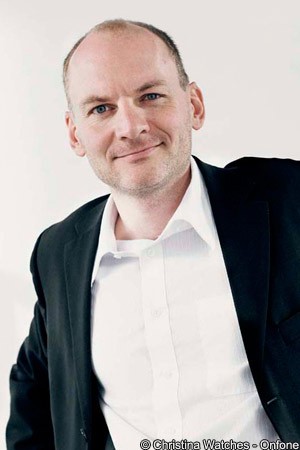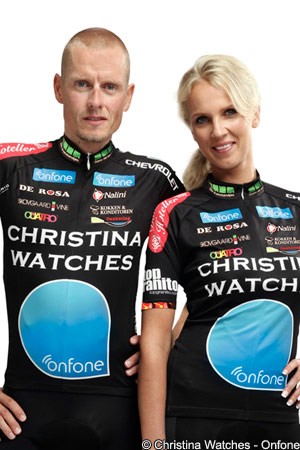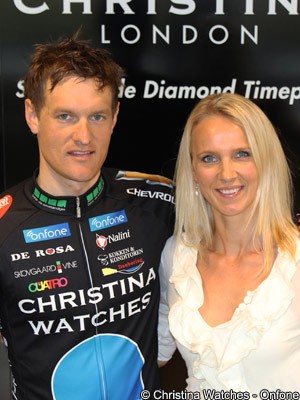Interview with team chairman Claus Hembo about squad’s philosophy
 Having already had preliminary talks on the subject, the Christina Watches – Onfone team has identified gaining a wildcard invitation to the 2013 Giro d’Italia as one of its top priorities.
Having already had preliminary talks on the subject, the Christina Watches – Onfone team has identified gaining a wildcard invitation to the 2013 Giro d’Italia as one of its top priorities.
The owners of the team saw this year’s race begin in the Scandinavian country, and this plus its goal of growing into a pro continental team has solidified an interest in the race.
“The management of the Giro came and visited us here,” Christina Watches -Onfone chairman Claus Hembo told VeloNation. “They were here when the Giro was in Denmark, and I think they liked what they saw. That race is our key target, and we are working towards riding it next year.”
Hembo states that the team has currently the second-biggest structure in Denmark after Saxo Bank. In order to secure a wildcard invite, it will have to grow further, increasing its budget and also stepping up its licence to Pro Continental level.
Hembo confirmed that this kind of growth is something he is aiming for, and affirms that the gap between where the team is are and where it wants to go is possible to close.
“Right now, the team is run on a Continental perspective, and we have quite a big budget,” he said. “Our current sponsor base is really happy with the team and the performances and the press coverage that we deliver.
“We have a really strong setup with Christina [his wife Christina Hembo, the well-known watch designer] and Michael Rasmussen. In Denmark both are very famous. The partnership between the bad boy Michael and this beautiful young blonde is working really, really well, and so our sponsors are really happy.
“What we are trying now is to show our team will continue to do well and to grow.”
Origins and evolution:
The team was set up prior to the 2011 season in response to the difficulties Michael Rasmussen had in finding a high-level contract. The Danish climber was personally sponsored by Hembo at the time, and she undertook to pay his salary if a big team took him on board.
 He had discussions with Bjarne Riis but, amid rumours of external pressure not to take him, the Saxo Bank chief finally decided that he wouldn’t give Rasmussen a fresh start.
He had discussions with Bjarne Riis but, amid rumours of external pressure not to take him, the Saxo Bank chief finally decided that he wouldn’t give Rasmussen a fresh start.
Hembo responded by saying that she felt so strongly that Rasmussen should be given a second chance that she was willing to set up a team around him. She and her husband Claus Hembo worked with the rider on that, then started recruiting others. Over a year later, the latter says that the team is in a good position, and that he considers it possible to make the step up to the next division
“We are a well-financed continental team. We have six brand new team cars, two brand new Volkswagen trucks, two double-decker buses, the best equipment money can buy,” Hembo said. “If you take our current budget and regard it as an index of 100, we need index 150 to go to the next level; in other words, right now we are missing 50 percent.
“I don’t think the next step is so big. You won’t find a lot of Continental teams who can tell you that they need to go from 100 to 150. That is of course because the team is already seen as being very big on the Continental stage.
“When it was announced on the ninth of December 2010, everybody was laughing. Brian Holm, then Danish sports director from HTC, called this a marketing stunt, that it was totally impossible. Now we are by far the largest team after Saxo Bank. We have more than 50 sponsors, strong riders and generally a strong setup. When you relate that to a very difficult time in the world, I think it highlights even more what the team has achieved.”
A debate about doping and second chances:
As Hembo himself states, team captain Michael Rasmussen has a bad boy image; he’s not the only one, thought, with two other previously-suspended riders forming part of the lineup. Stefan Schumacher is also on board, while last week Thomas Frei [pictured] was signed to the team for the remainder of the season.
 Of those, Rasmussen’s case is the best known. The former Tour de France King of the Mountains was ejected by his-then Rabobank team from the 2007 Tour while looking almost certain to win the race. He was later handed a two year ban over whereabouts violations.
Of those, Rasmussen’s case is the best known. The former Tour de France King of the Mountains was ejected by his-then Rabobank team from the 2007 Tour while looking almost certain to win the race. He was later handed a two year ban over whereabouts violations.
Rasmusssen returned to the sport in 2009, racing with Team Tecos Trek that year and Team Miche in 2010. He then became involved with setting up the Christina Watches team when Saxo Bank decided it wouldn’t sign him.
Hembo defends the recruitment policy, but the team has nevertheless come under criticism from those who said that opportunities should be given to riders without a doping history rather than those who have been banned.
Danish Cycling Union president Tom Lund is the latest to argue this point, telling sporten.dk today that he believes the team should take a different approach and foster the progression of young riders from that country.
“We would like that Christina Watches-Onfone looked more at the development of Danish talent rather than on just those who might be available on the market,” he said. “Right now it is not CWO [Christina Watches-Onfone] who takes care of talents in Danish cycling.”
However Hembo is adamant that the team is doing the right thing, and that there is nothing wrong in giving a new opportunity to those who have returned to the sport after a suspension.
In fact, he sees it as something which is lacking elsewhere.
“Our policy is well known. Without being over-religious, we have some Christian basic values that we think our society, at least in Denmark, can build upon,” he argued. “It means that if you make a mistake, you should count on some people being willing to forgive you. Here that means that if you are sorry about what you did, and if you publically say no to doping, we are willing to give you that second chance.
“That doesn’t mean you can do one crime after another, like [Riccardo] Riccò or someone like that. But for one young guy doing one mistake, we think it is correct to say ‘welcome back.’”
In some ways, he suggests the team is righting a wrong. “This is also a protest against general thinking in cycling sport, because when people get a two year quarantine, for us that is the same as saying that you will be welcome back after that period. However in reality, if you do doping, it’s a lifetime ban.”
The area is one of the most hotly-discussed in the sport, leading to constant debate. So what does Hembo feel about the argument that the current sanctions are not firm enough to be a sufficient deterrent against doping?
“A lifetime ban is okay if people are told that up front,” he answered. “If everybody knows that from this point on, if you ever violate any doping rules in cycling you are out forever, then that is okay…but that’s not the case under the current rules.
“Some people say funny things about the team as we have Rasmussen, Schumacher and Frei. But to be honest, we think that we are on the right side, and that those who think differently have a way of looking at others that we disagree with and we dislike.”
Essentially, his philosophy appears to be a case of ‘let he who is without sin cast the first stone,’ or, more accurately, that humans are fallible and that there needs to be some scope for redemption.
“I made mistakes in my life and I hope people are willing to forgive me my few mistakes,” he explained. “I think very few of us can claim never to have done any mistakes. We think it is totally wrong that just because riders are in a particular group, that if they do something wrong, they should never be forgiven for the rest of their life. That’s not fair.”
What is worth acknowledging though is unlike Frei, both Rasmussen and Schumacher denied for a long time that they ever used doping products. Had they been more up front about their past, its likely that the reaction to their return would have been different.
Still, when Hembo argues that a two year suspension should not effectively turn out to represent a lifetime ban, and that second chances are warranted under the current rules, there is a logic there too.
Until such time as longer bans are introduced, it means the subject is a far more complex one than a clear black and white scenario.
Race invites and team ranking:
On January 27th the UCI issued the Continental team ‘fictitious’ rankings which would determine invites to races during the current season. Christina Watches was highest-placed in the Europe Tour, and Hembo said that this has given the team a large range of starts.
“We were ranked by the UCI as the best European Continental team before the season, meaning that around 175 race must invite us. Beside that, we get a lot of invitations for many very nice races,” said Hembo. “We have the luxury problem that we have to say no to five to six UCI races every weekend.
“We did the Tour de San Luis, we did some in Spain, the Tour of Denmark of course and the Tour of Norway next week. In September we will do the Tour of China. Our calendar is packed. If you are thinking if they have a problem getting into races, then no – we are privileged and very happy that so many races want us there.”
However while the team has the invites and a large budget, it will also need to step up a level in terms of results for next season. It is currently ranked 44th in the Europe Tour; many of those ahead are Pro Continental teams, but if it wants to push for a Giro start in 2013, results and points will be needed.
Hembo acknowledges this. He states that in addition to seeking additional backing from current sponsors and bringing new ones on board to secure the extra 50% in budget needed, improving the general level of the team is also a priority.
“We are working very hard to be a pro continental team next year. Last year we had too many riders and had to change to continue our growth. We are of course trying to build up a framework that would also work on a Pro Continental basis.
“We don’t just want to have one [big] rider, say Rasmussen, we want to have good riders who can continue to follow the team until the next level,” he said.
“The next level for us is very clear. We work really hard to be pro continental, and our big target for next year is the Giro d’Italia.”